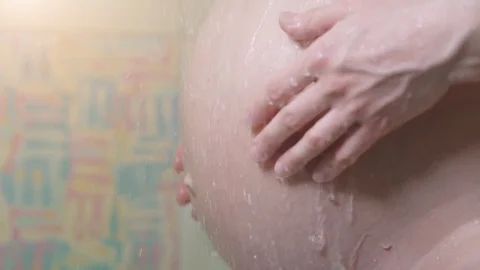Hot showers are a common way to relax and unwind after a long day, but for pregnant women, they may be a cause for concern. Many expectant mothers wonder whether hot showers are safe during pregnancy, and what impact they may have on their developing baby.
Understanding the potential risks and benefits of hot showers during pregnancy is important for ensuring the health and well-being of both mother and baby.
One of the main concerns with hot showers during pregnancy is their impact on body temperature. Hot water can cause the body to overheat, which can be dangerous for both the mother and the baby.
Additionally, hot showers can cause dehydration, which can lead to a range of health problems. It is important for pregnant women to be aware of these risks and to take steps to manage their body temperature and stay hydrated.
Key Takeaways
- Hot showers can be risky during pregnancy due to their impact on body temperature and dehydration.
- Pregnant women should take precautions to manage their body temperature and stay hydrated when taking hot showers.
- Healthcare professionals can provide additional advice and recommendations for managing body temperature during pregnancy.
Understanding the Impact of Hot Showers on Pregnancy

Pregnancy is a delicate stage in a woman’s life, and it is essential to take care of oneself and the growing fetus. One aspect that requires attention is the temperature of the showers taken during pregnancy.
Hot showers are widely popular and have several benefits, but when it comes to pregnant women, the impact of hot showers is a matter of concern.
Hot Showers During Pregnancy
Hot showers during pregnancy can have adverse effects on both the mother and the baby. The high temperature of the water can cause the blood vessels to dilate, leading to a drop in blood pressure. This can result in dizziness and fainting, which can be dangerous for the mother and the baby.
Hot Showers While Pregnant
Hot showers while pregnant can also lead to dehydration. The hot water can cause excessive sweating, leading to a loss of fluids from the body. Dehydration can cause several complications during pregnancy, such as preterm labor, low amniotic fluid levels, and even birth defects.
Understanding the Impact of Hot Showers
Understanding the impact of hot showers on pregnancy is crucial. Pregnant women should avoid hot showers and opt for warm or lukewarm showers instead. The ideal temperature for a shower during pregnancy is around 98-100°F.
Conclusion
In conclusion, pregnant women should be cautious about the temperature of the showers they take. Hot showers can have adverse effects on both the mother and the baby, leading to complications during pregnancy. It is essential to take care of oneself during pregnancy and avoid anything that can harm the growing fetus.
Effects on Body Temperature

Core Body Temperature
During pregnancy, it is important to maintain a stable body temperature. Hot showers can increase body temperature, which can be harmful to both the mother and the developing fetus. The core body temperature should not exceed 102.2°F (39°C) during pregnancy, as it can lead to birth defects and miscarriage.
When taking a hot shower, the body temperature can rise above the safe limit. The effects of hot showers on body temperature can be more significant during the first trimester of pregnancy. Pregnant women should avoid taking hot showers or baths, especially during the first trimester.
Signs of Overheating
Overheating can cause several adverse effects on the mother and the fetus. The signs of overheating include sweating, dizziness, nausea, and fatigue.
If a pregnant woman experiences any of these symptoms, she should immediately stop taking the hot shower and move to a cooler environment.
To avoid overheating, pregnant women should limit the duration of their showers and ensure that the water temperature is not too hot. They should also drink plenty of fluids to prevent dehydration and maintain a stable body temperature.
In conclusion, hot showers can increase body temperature, which can be harmful to both the mother and the developing fetus. Pregnant women should avoid taking hot showers or baths, especially during the first trimester, to reduce the risk of overheating.
Potential Risks and Precautions
Pregnancy is a delicate time for a woman and requires special care. While taking a hot shower may seem like a relaxing way to relieve stress, it is important to understand the potential risks and precautions involved.
Neural Tube Defects
One of the risks associated with hot showers during pregnancy is the possibility of neural tube defects in babies. A neural tube defect occurs when the neural tube, which forms the baby’s brain and spinal cord, does not close properly. This can lead to serious health issues, including paralysis and even death.
To reduce the risk of neural tube defects, pregnant women are advised to avoid hot showers and baths, especially during the first trimester. Instead, they should opt for warm water temperatures that do not raise their body temperature above 101°F.
Miscarriage and Preterm Labor
Taking hot showers during pregnancy can also increase the risk of miscarriage and preterm labor. This is because hot water can raise the body temperature, which can cause the uterus to contract and lead to premature birth.
To reduce the risk of miscarriage and preterm labor, pregnant women should avoid hot showers and baths, especially during the first and third trimesters. They should also monitor their body temperature and avoid activities that can raise their body temperature, such as exercising in hot weather or using saunas and hot tubs.
Dizziness and Fainting
Another risk associated with hot showers during pregnancy is dizziness and fainting. Hot water can cause blood vessels to dilate, which can lower blood pressure and cause dizziness or fainting.
To reduce the risk of dizziness and fainting, pregnant women should avoid hot showers and baths, especially if they feel lightheaded or dizzy. They should also take their time getting up from a sitting or lying position and avoid standing for long periods of time.
In conclusion, pregnant women should take precautions when it comes to hot showers and baths to ensure the health and safety of themselves and their babies.
By avoiding hot water temperatures and monitoring their body temperature, pregnant women can reduce the risk of neural tube defects, miscarriage, preterm labor, dizziness, and fainting.
The Role of Baths and Hot Tubs
Pregnancy can be a challenging time for many women, and finding ways to relax and unwind can be essential. One of the most popular methods of relaxation is taking a bath or soaking in a hot tub.
However, when it comes to pregnancy, there are some important considerations to keep in mind to ensure the safety of both the mother and the baby.
Safe Bath Temperature
When taking a bath, it is important to make sure the water temperature is safe for both the mother and the baby. The American Pregnancy Association recommends keeping the water temperature at or below 100 degrees Fahrenheit.
Water that is too hot can cause the mother’s body temperature to rise, which can be dangerous for the baby.
It is also important to avoid adding anything to the bathwater that could be harmful to the baby, such as bubble bath or bath salts. These products can irritate the mother’s skin and potentially harm the baby.
Hot Tubs and Saunas
Hot tubs and saunas are not recommended for pregnant women. The high temperatures can cause the mother’s body temperature to rise, which can be dangerous for the baby. In addition, the chemicals used to keep hot tubs and saunas clean can be harmful to the baby.
If a pregnant woman does choose to use a hot tub or sauna, it is important to limit the amount of time spent in them and to make sure the water temperature is below 100 degrees Fahrenheit.
In summary, taking a bath can be a safe and relaxing way for pregnant women to unwind. However, it is important to keep the water temperature at or below 100 degrees Fahrenheit and to avoid using any products that could be harmful to the baby.
Hot tubs and saunas should be avoided, but if used, the water temperature should be below 100 degrees Fahrenheit and the time spent in them should be limited.
Managing Body Temperature

During pregnancy, it is important to manage body temperature to ensure the health of the mother and the baby. Hot showers can be relaxing, but they can also raise body temperature to dangerous levels.
To manage body temperature, there are a few strategies that pregnant women can use.
Cool Showers
Taking cool showers is one way to manage body temperature during pregnancy. Cool water can help lower body temperature and prevent overheating. It is important to note that cool water should not be too cold, as this can also be harmful.
Pregnant women should aim for a comfortable temperature that is not too hot or too cold.
Exercising
Exercising can also help manage body temperature during pregnancy. Regular exercise can help regulate body temperature and improve overall health. Pregnant women should avoid exercising in hot and humid conditions, as this can increase the risk of overheating.
It is important to stay hydrated before, during, and after exercise by drinking plenty of fluids.
By taking cool showers and exercising regularly, pregnant women can manage their body temperature and stay healthy. It is important to consult with a healthcare provider before starting any exercise program during pregnancy.
Healthcare Advice and Recommendations
1. American College of Obstetricians and Gynecologists Guidelines
The American College of Obstetricians and Gynecologists (ACOG) recommends that pregnant women avoid hot tubs and saunas during the first trimester of pregnancy. This is because high body temperatures during the first trimester can increase the risk of certain birth defects.
However, taking a warm shower is generally considered safe during pregnancy.
It is important to note that the temperature of the water should not be too hot. Pregnant women should avoid water temperatures above 100°F (38°C). Water that is too hot can cause burns, dizziness, and dehydration.
It is recommended that pregnant women keep the water temperature at or below body temperature (98.6°F or 37°C).
2. Centers for Disease Control and Prevention Guidelines
The Centers for Disease Control and Prevention (CDC) recommends that pregnant women take precautions to avoid infections during pregnancy. This includes avoiding exposure to certain bacteria and viruses that can be found in hot tubs, saunas, and other warm water sources.
Pregnant women should avoid hot tubs and saunas that are not properly maintained and disinfected. They should also avoid sharing towels, swimsuits, and other personal items with others.
Additionally, pregnant women should avoid drinking the water in hot tubs and saunas, as this can increase the risk of infection.
3. Healthcare Provider Recommendations
It is important for pregnant women to talk to their healthcare provider about any concerns they have regarding hot showers or other warm water sources.
Pregnant women with certain medical conditions, such as high blood pressure or gestational diabetes, may need to avoid hot showers or other warm water sources altogether.
Overall, pregnant women can enjoy a warm shower during pregnancy as long as they take precautions to avoid water that is too hot and properly maintain their shower. It is important to follow the guidelines set forth by ACOG and the CDC to ensure a safe and healthy pregnancy.
Additional Considerations
1. Bath Bombs and Epsom Salt
When it comes to taking a hot shower during pregnancy, some women may be tempted to add bath bombs or Epsom salt to their bathwater. While these products can enhance the bathing experience, it’s important to consider their potential effects on pregnancy.
Bath bombs are often scented and colored, and some contain glitter or other additives. While they can make for a luxurious soak, the fragrances and dyes used in some bath bombs may irritate sensitive skin.
Additionally, some bath bombs contain sodium bicarbonate, which can disrupt the pH balance of the vagina and increase the risk of infection.
Epsom salt, on the other hand, is a natural mineral compound that can help soothe sore muscles and reduce inflammation. It’s generally considered safe to use during pregnancy, but it’s important to use caution when soaking in an Epsom salt bath.
Pregnant women should avoid soaking in water that is too hot, as it can increase the risk of overheating and dehydration.
2. Essential Oils
Essential oils are highly concentrated plant extracts that are commonly used for aromatherapy and other therapeutic purposes. While some essential oils are safe to use during pregnancy, others can be harmful to the developing fetus.
Pregnant women should avoid using essential oils that are known to stimulate uterine contractions, such as clary sage, rosemary, and thyme. Additionally, essential oils should never be ingested during pregnancy, as they can be toxic in large doses.
When using essential oils during pregnancy, it’s important to dilute them properly and use them in well-ventilated areas. Pregnant women should also be aware of any potential allergic reactions and discontinue use if any adverse effects occur.
Overall, it’s important for pregnant women to exercise caution when using bath products and essential oils. While these products can enhance the bathing experience, they can also pose risks to the developing fetus if used improperly.
Conclusion
In conclusion, hot showers during pregnancy can be safe and beneficial for many women. However, it is important to be cautious and mindful of the temperature and duration of the shower, as well as any preexisting medical conditions. Here are some key takeaways:
- Hot showers can help relieve pregnancy-related aches and pains, such as back pain and sore muscles.
- Showers should be kept at a moderate temperature, around 98-100°F, to avoid overheating and potential harm to the fetus.
- Pregnant women with preexisting medical conditions, such as hypertension or gestational diabetes, should consult with their healthcare provider before taking hot showers.
- It is important to stay hydrated before, during, and after a hot shower to prevent dehydration and overheating.
Overall, hot showers can be a relaxing and soothing way for pregnant women to alleviate discomforts and promote overall well-being. By following these guidelines and consulting with a healthcare provider if necessary, pregnant women can safely enjoy the benefits of hot showers.
Related post: Extreme Fatigue Before Labor
Frequently Asked Questions
How long can I take a warm shower during pregnancy?
It is generally safe to take warm showers during pregnancy. However, it is recommended to keep the shower time to a minimum. Experts suggest limiting showers to no more than 10-15 minutes to avoid overheating.
How can I tell if my shower is too hot while pregnant?
Pregnant women should avoid hot showers that cause sweating, redness, or overheating. It is recommended to keep the water temperature below 100°F (38°C) to prevent any negative effects on the baby.
What are the risks of taking hot showers during pregnancy?
Hot showers can increase the body temperature of pregnant women, which can lead to a number of negative effects on the baby. These include neural tube defects, miscarriage, and preterm labor. It is recommended to avoid hot showers during pregnancy.
Are hot showers safe during the third trimester of pregnancy?
Hot showers should be avoided during the third trimester of pregnancy, as the baby is more sensitive to changes in body temperature. It is recommended to take warm showers instead, and to keep the water temperature below 100°F (38°C).
How often should I shower during pregnancy?
Pregnant women should shower regularly to maintain good hygiene. It is recommended to shower at least once a day, or more if necessary.
Can hot showers have negative effects on my baby during pregnancy?
Hot showers can increase the body temperature of pregnant women, which can lead to a number of negative effects on the baby. These include neural tube defects, miscarriage, and preterm labor. It is recommended to avoid hot showers during pregnancy and to take warm showers instead.

Iesha is a loving mother of 2 beautiful children. She’s an active parent who enjoys indoor and outdoor adventures with her family. Her mission is to share practical and realistic parenting advice to help the parenting community becoming stronger.
